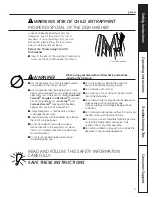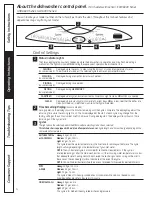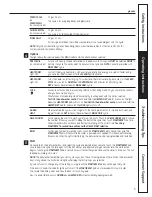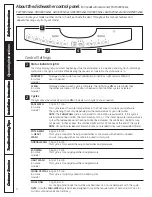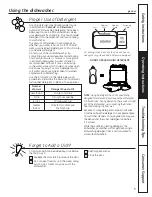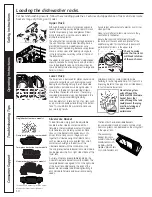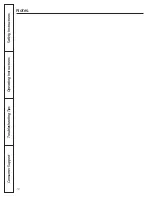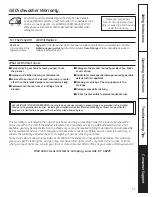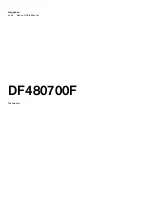
15
Consumer S
uppor
t
Tr
oubleshooting Tips
Operating Instructions
Safety Instructions
ge.com
Problem
Possible Causes
What To Do
Detergent left in
Dishes are blocking the
•
Reposition the dishes so the water from the lower spray arm can
dispenser cups
detergent cup
flush the detergent cup. See the
Loading the dishwasher
section.
Black or gray
Aluminum utensils have
•
Remove marks with a mild, abrasive cleaner.
marks on dishes
rubbed against dishes
Dishes don’t dry
Low inlet water temperature
•
Make sure inlet water temperature is at least 120°F.
•
Select
HEATED DRY.
•
Use
HOT START
,
HOT WASH
or
ADDED HEAT
options.
•
Select a higher cycle, such as
ANTI-BACTERIA
,
SANI WASH
,
POTS & PANS
or
HEAVY WASH
.
Rinse agent dispenser is empty
•
Check the rinse agent dispenser and fill as required.
Control panel responded
Door latch may not be properly
•
Make sure the door is firmly closed.
to inputs but dishwasher
seated
never filled with water
Water valve may be turned off
•
Make sure water valve (usually located under the sink) is turned on.
Stained tub interior
Some tomato-based foods can
•
Use of the
RINSE ONLY
cycle after adding the dish to the load
cause reddish stains
can decrease the level of staining. GE recommends
Cascade
®
Plastic Booster
to help remove these types of stains.
Tea or coffee stains
•
Remove the stain by hand, using a solution of 1/2 cup bleach
and 3 cups warm water.
WARNING
Before cleaning interior, wait at least 20 minutes after a cycle for the
heating elements to cool down. Failure to do so can result in burns.
An overall yellow or brown film can •
A special filter in the water supply line is the only way to correct
be caused by iron deposits in water
this problem. Contact a water softener company.
White film on inside surface—
•
GE recommends
Jet-Dry
®
or
Cascade Crystal Clear
®
to help
hard water minerals
prevent hard water mineral deposits from forming.
•
Run dishwasher with citric acid to remove mineral deposits. Citric acid
(Part number: WD35X151) can be ordered through GE Parts. See back
cover for ordering information.
Dishwasher won’t run
Fuse is blown or circuit breaker
•
Replace fuse or reset circuit breaker. Remove any other appliances from
is tripped
the circuit.
Power is turned off
•
In some installations, the power to the dishwasher is provided through a
wall switch, often located next to the disposer switch. Make sure it is on.
Control panel is locked
•
Unlock control panel. See page 5.
Reboot your control
•
Turn off power to the dishwasher (circuit breaker or wall switch) for
30 seconds; then turn back on.
Control panel lights
Time too long between
•
Each pad must be touched within 30 seconds of the others.
go off when you’re
touching of selected pads
To relight, touch any pad again, or unlock and relatch door.
setting controls
Water standing in
This is normal
•
A small amount of clean water around the outlet on the tub
the bottom of the tub
bottom at the back of the tub keeps the water seal lubricated.
Water won’t pump
Drain is clogged
•
If you have an air gap, clean it. See page 13.
out of the tub
•
If the dishwasher drains into a disposer, run disposer clear.
•
Check to see if your kitchen sink is draining well. If not, you
may need a plumber.
Steam
This is normal
•
Warm, moist air comes through the vent by the door latch during drying
and when water is being pumped out. This is necessary for drying.
Sanitized light does
The door was opened and the
•
Do not interrupt the cycle anytime during or after main wash.
not illuminate at the
cycle was interrupted during
end of the cycle
or after the main wash portion
(Anti-Bacteria
The incoming water
•
Raise the water heater temperature to between 120°F and 140°F.
cycle only)
temperature was too low
Noise
Normal operating sounds
•
Detergent cup opening.
•
Water entering dishwasher.
•
The motor stops and starts at various times during the cycle.
•
Drain pump sounds during the pump out.
Rattling dishes when the spray •
Make sure dishes are properly loaded. See the
Loading the
arm rotates
dishwasher racks
section.



